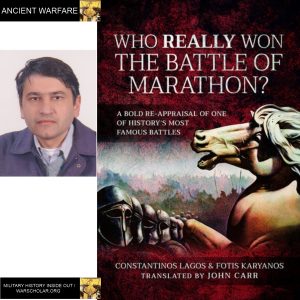Podcast: Play in new window | Download
Subscribe: RSS
 Check out this book here https://amzn.to/2y56tEs
Check out this book here https://amzn.to/2y56tEs
Dr. Constantinos Lagos is a Greek historian who teaches at the Hellenic Air Force Academy in Greece. He’s written two books on Greece in World War II but he has also recently co-authored a book on the very famous ancient Greek battle of Marathon. The book offers a reappraisal of the location, details and political outcomes of the battle. We spoke about the book and what it took to write it.
0:57 – Constantinos talks about his early studies in ancient history.
3:03 – Constantinos talks about how he breaks down the book and it’s analysis of the battle and discusses the Persians.
6:04 – Constantinos talks about previous errors of reconstructing the battle of Marathon and why the errors were made.
10:37 – Constantinos talks about the marsh phase of the battle.
12:43 – Constantinos talks about the battle and the strengthening of democracy.
14:39 – Constantinos talks about the site where people think the battle took place.
18:38 – Constantinos talks about other differences between established thinking and new findings about the battle.
22:12 – Constantinos talks about the archaeological discoveries they applied to their analysis.
25:17 – Constantinos talks about the Greek military camp at issue in the book.
29:33 – We discuss established versus new archaeological ideas and the archaeologists who studied Marathon.
35:52 – Constantinos talks about the archaeological evidence related to the battle of Marathon.
40:47 – Constantinos addresses the question of Persian records of the battle.
41:55 – Constantinos talks about the events before the battle and the discoveries made during the research.
He also touches on the ancient terrain at the time of the battle.
47:53 – Constantinos talks about the German scholars who studied classical Greece.
51:33 – Constantinos talks about his desire for archaeologists to excavate the battle and the marsh in the area.
58:35 – Constantinos gives mroe details about the Greek camp he found and the connection he felt with ancient Greece.
1:05:53 – Constantinos talks about what the weather [would] might have been like during the battle.
1:08:54 – Constantinos remarks about how many people have written about the battle over the centuries.
1:16:36 – Constantinos can be found on the web by googling his name “Constantinos Lagos” or by checking the book out at Pen & Sword Books.
Links of interest
https://www.pen-and-sword.co.uk/Who-Really-Won-the-Battle-of-Marathon-Hardback/p/16501
For more “Military History Inside Out” please follow me at www.warscholar.org, on Facebook at warscholar, on twitter at Warscholar, on youtube at warscholar1945 and on Instagram @crisalvarezswarscholar. Or subscribe to the podcast on Apple Podcasts | Stitcher | Spotify
Guests: Dr. Constantinos Lagos
Host: Cris Alvarez
Tags: military, history, military history, conflict, war, interview, non-fiction book, marathon, persia, darius, athens, greece, democracy, Attica, cavalry, hoplites, Platea, ostracism, thetis, demos, platea, Persian Wars, archaeologist, classical, archaic, fort, bronze, arrowheads, acropolis, british museum, geologist, Pericles, world war two, WWII, Philip of greece, duke of edinburgh
Check out this book here https://amzn.to/2y56tEs
As an Amazon Associate I earn from qualifying purchases.

